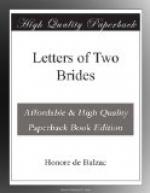“Spain, the country for castles in the air!” I cried. “Perhaps you hope that it may mean marriages for me!”
For sole reply he honored me with a meaning look. For some days he has amused himself with teasing me at lunch; he watches me, and I dissemble. In this way I have played with him cruelly as father and ambassador in petto. Hadn’t he taken me for a fool? He asked me what I thought of this and that young man, and of some girls whom I had met in several houses. I replied with quite inane remarks on the color of their hair, their faces, and the difference in their figures. My father seemed disappointed at my crassness, and inwardly blamed himself for having asked me.
“Still, father,” I added, “don’t suppose I am saying what I really think: mother made me afraid the other day that I had spoken more frankly than I ought of my impressions.”
“With your family you can speak quite freely,” my mother replied.
“Very well, then,” I went on. “The young men I have met so far strike me as too self-centered to excite interest in others; they are much more taken up with themselves than with their company. They can’t be accused of lack of candor at any rate. They put on a certain expression to talk to us, and drop it again in a moment, apparently satisfied that we don’t use our eyes. The man as he converses is the lover; silent, he is the husband. The girls, again, are so artificial that it is impossible to know what they really are, except from the way they dance; their figures and movements alone are not a sham. But what has alarmed me most in this fashionable society is its brutality. The little incidents which take place when supper is announced give one some idea—to compare small things with great—of what a popular rising might be. Courtesy is only a thin veneer on the general selfishness. I imagined society very different. Women count for little in it; that may perhaps be a survival of Bonapartist ideas.”
“Armande is coming on extraordinarily,” said my mother.
“Mother, did you think I should never get beyond asking to see Mme. de Stael?”
My father smiled, and rose from the table.
Saturday.
My dear, I have left one thing out. Here is the tidbit I have reserved for you. The love which we pictured must be extremely well hidden; I have seen not a trace of it. True, I have caught in drawing-rooms now and again a quick exchange of glances, but how colorless it all is! Love, as we imagined it, a world of wonders, of glorious dreams, of charming realities, of sorrows that waken sympathy, and smiles that make sunshine, does not exist. The bewitching words, the constant interchange of happiness, the misery of absence, the flood of joy at the presence of the beloved one—where are they? What soil produces these radiant flowers of the soul? Which is wrong? We or the world?




